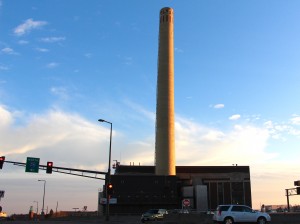In Duluth in December, temperatures drop and heating bills rise. Partly due to Duluth’s steam heating system growing damaged, inefficient and outdated.
A recent grant application has proposed to fix that.
That proposal came from Big Water Minnesota, a joint effort between the City of Duluth, the Minnesota Department of Employment and Economic Development (DEED), Ecolibrium3, and LISC (Local Initiatives Support Corporation) Duluth.
As a part of Big Water Minnesota’s $76 million grant application through the Department of Housing and Urban Development (HUD), $41 million would be earmarked to repair and improve Duluth’s steam heating infrastructure.
As the system currently operates, water is drawn from Lake Superior at an average temperature of 40 degrees. That water is then heated to 365 degrees through burning coal and pumped throughout the downtown area.
This system currently cycles and heats 90 million gallons of water a year.
“The way the system works now is that we dump 190 degree water into the sewer system and then we start with 40 degree water again, which shouts as inefficient,” said Jodi Slick, CEO and founder of Ecolibrium3. “Most hot water systems would be functioning at 190 degrees, so what we dump right now is exactly what we would use as our input, or as our heat source.”
Slick describes part of the proposal to create a closed loop system, where the heated water is recycled through to reduce the need for burning coal.
Before the water efficiency can be improved, the application plans to repair the current piping system that was damaged in the 2012 flood.
The piping system was built in the 1930s and ‘40s and insulated with asbestos. Floodwaters saturated the insulation, and when it boiled on reaching the pipes it damaged the insulation.
In 2014 it was calculated that 20 percent of all heat generated was lost to these inefficiencies, according to Big Water Minnesota’s grant application.
The goal is to replace the pipes with modern, thermally insulated pipes. This will allow for increased efficiency and an eventual transition from burning coal to using regionally derived biomass.
A portion of the $41 million requested for the project would also go towards modifying and connecting Superior Street buildings, which are noted in the application for providing “services to some of Duluth’s most vulnerable populations,” as well as supplying more heat to medical facilities in the downtown area.
Duluth will find out the status of the grant in January, 2016.

